Introduction
One remarkable tool that has emerged as a game-changer in healthcare communication is none other than WhatsApp.
With over 2 billion users globally, WhatsApp is already familiar and trusted. It is also readily available for 85% of healthcare teams and patients (Source: Rock Health Report).
Imagine a scenario where doctors, nurses, and other healthcare professionals can seamlessly connect and collaborate, regardless of their physical location. Picture patients receiving real-time updates and medical advice from their healthcare providers, all through a messaging app they likely already use daily.
Well, WhatsApp is making this a reality. As 72% of healthcare organizations are currently testing or deploying WhatsApp business tools to improve care coordination (Source: MessengerPeople).
In this blog, we'll delve into WhatsApp in healthcare and explore how it enhances collaboration and care. We'll uncover the "who, what, when, where, why, and how" behind the benefits of WhatsApp in healthcare.
We'll discover how doctors, nurses, patients, and caregivers all benefit from the power of instant communication, secure data sharing, and improved care coordination.
What is WhatsApp in Healthcare?
WhatsApp has rapidly gained prominence across global healthcare ecosystems owing to conveniences around instant messaging for enhanced doctor-patient communication along with audio/video consultations.
The platform's encrypted architecture also displays potential for secured data exchange necessary in healthcare contexts
For patients, interacting with hospital systems via a trusted mainstream chatting interface like WhatsApp cultivates technology receptiveness, especially benefiting elder demographics.
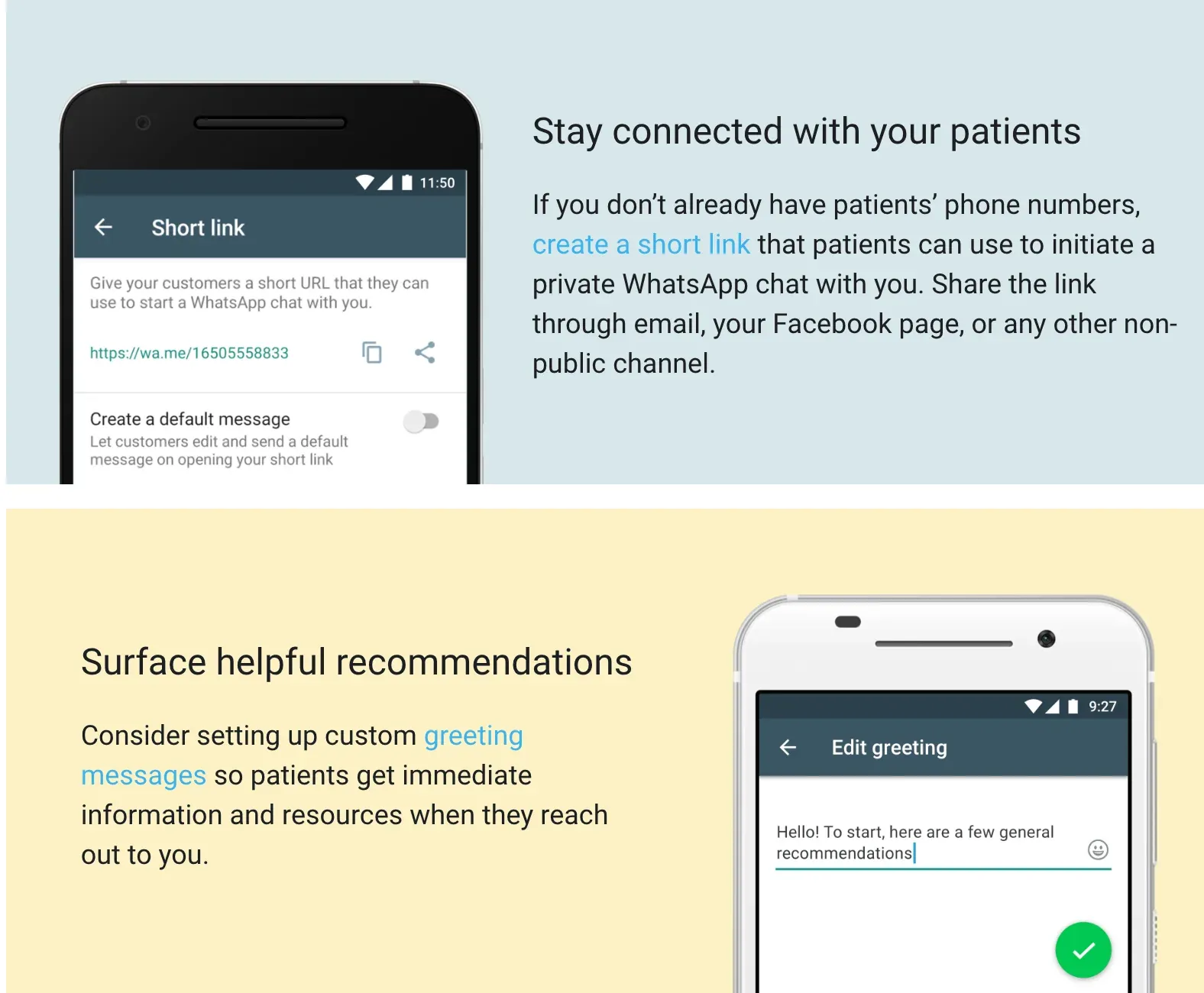
Features like creating and tagging message groups, media sharing and cross-platform ubiquity greatly enable self-care coordination, appointment bookings and medication reminders.
Healthcare teams utilize WhatsApp for faster internal discussions around patient care transitions, discharge summaries and lab reports by creating dedicated groups while tagging relevant personnel.
Group video calls also improve family inclusion in treatment planning.
Telemedicine and mHealth services apply WhatsApp for affordable virtual visits to evaluate symptoms, review test results and prescribe basic home remedies eliminating travel - which expanded access during COVID-19 lockdowns.
Automated chatbots integrating hospital IT systems are also on the rise for handling FAQs around billing, insurance coverage and handling prescription requests.
However, despite the convenience factors, adoption intricacies exist due to HIPAA compliance limitations for American hospitals around patient privacy as WhatsApp exchanges some metadata with its parent Facebook. Data localization regulations in international markets are also still progressing.
Additionally, message traceability for care pathways and analytics around patient behavior change attribution need maturation
In summary, while fundamental communication and access boosting advantages make WhatsApp's role in mainstream healthcare delivery seem inevitable globally, optimism must be balanced by addressing limitations around compliance, analytics and diagnostic security as institutional adoption expands.
Solutions targeting these will accelerate widespread integration.
Why is WhatsApp Used in Healthcare?
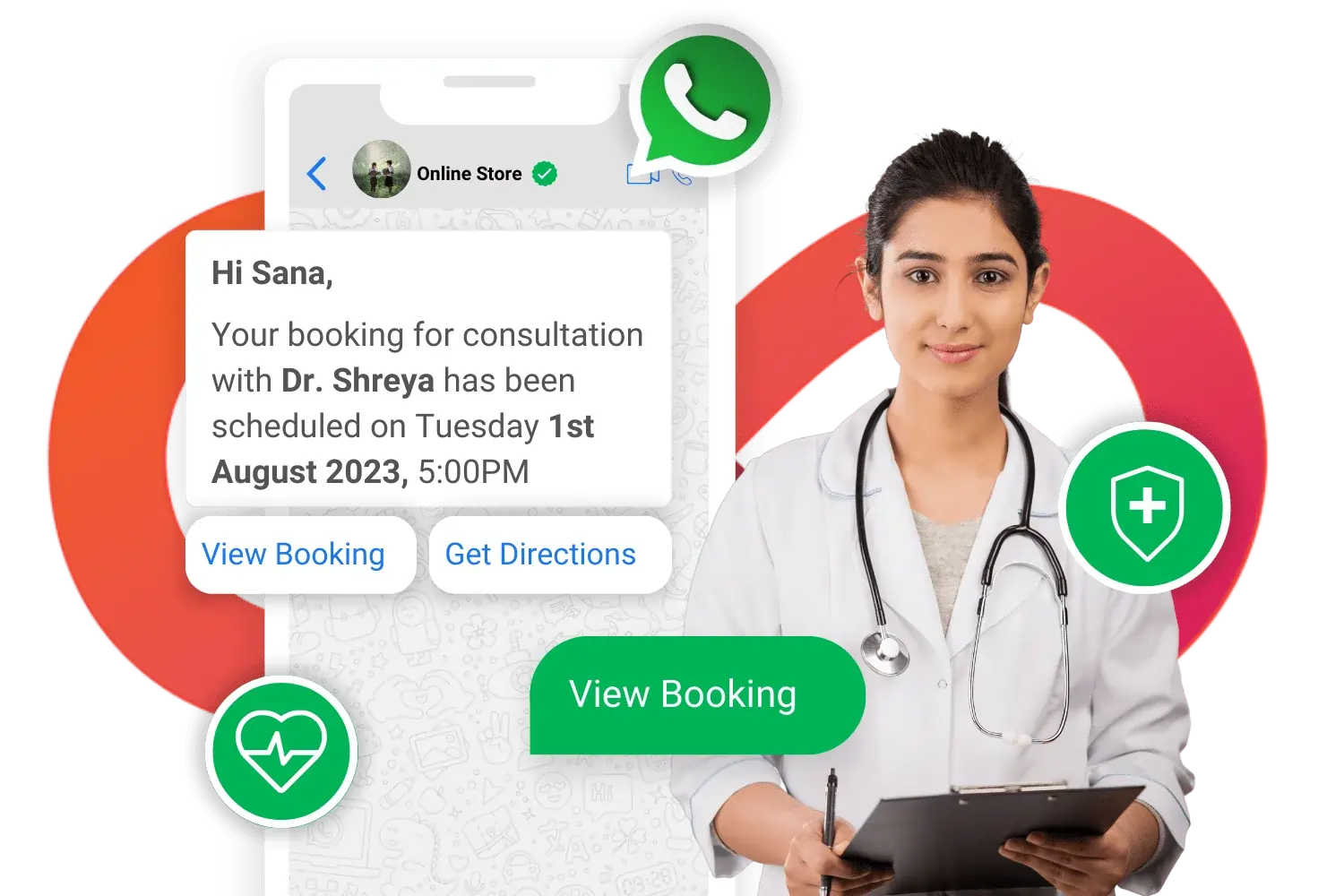
WhatsApp is increasingly being used in the healthcare industry due to its numerous benefits and functionalities. Here are some reasons why WhatsApp is being adopted in healthcare:
Instant Messaging for Quick and Efficient Communication
WhatsApp's instant messaging feature allows healthcare professionals to communicate quickly and efficiently, facilitating prompt decision-making and response times.
Whether it's a doctor seeking advice from a specialist or a nurse informing a physician about a critical change in a patient's condition, instant messaging on WhatsApp ensures that information is conveyed in real-time.
Real-Time Updates at your Fingertips
With WhatsApp, healthcare professionals can receive real-time updates regarding patient conditions, test results, or changes in treatment plans.
This instant access to vital information allows for better coordination and collaboration among healthcare teams, ultimately leading to improved patient outcomes.
Breaking Down Communication Barriers
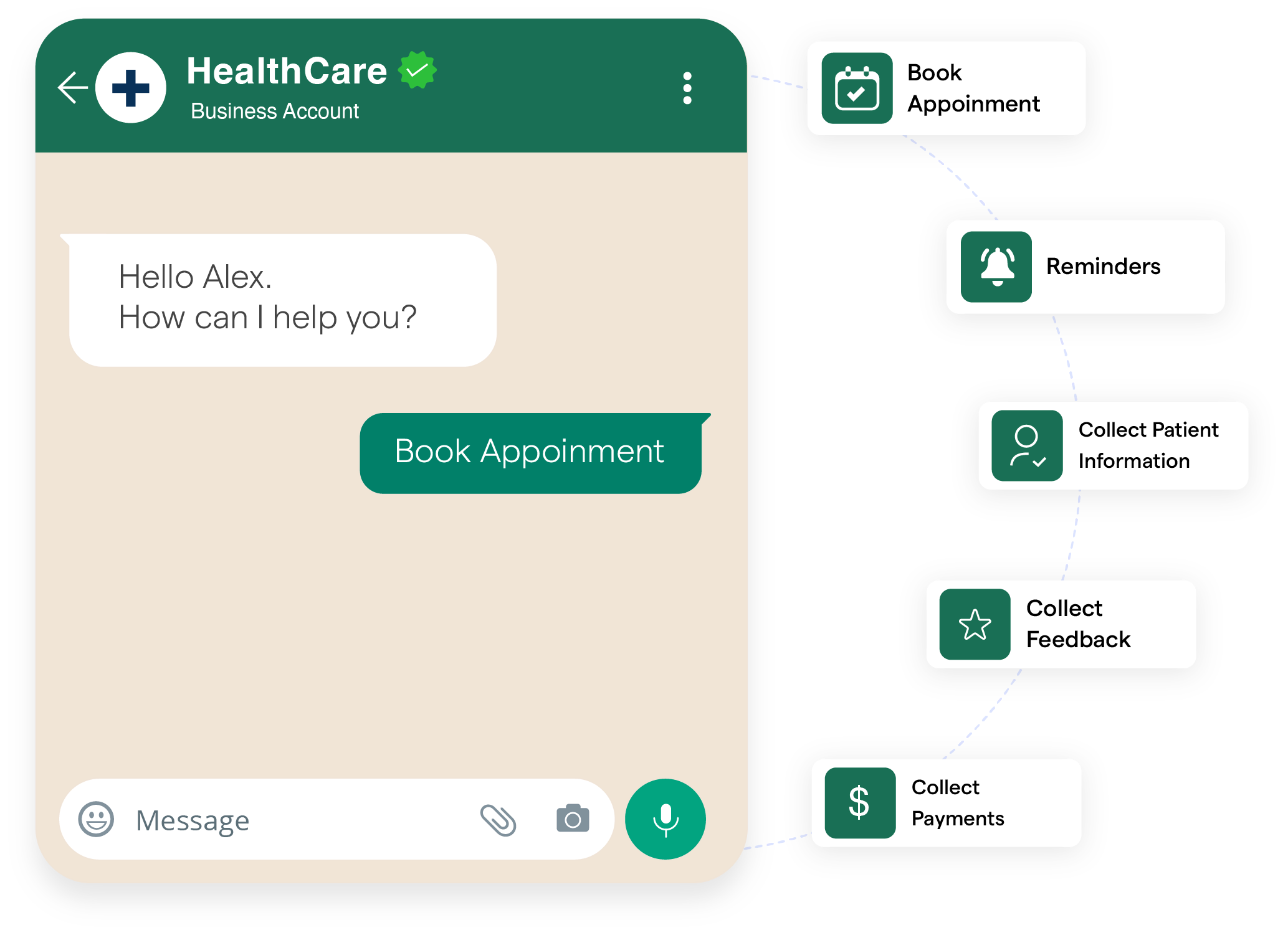
Healthcare is a multidisciplinary field that requires effective communication among various professionals, including doctors, nurses, technicians, and administrators.
WhatsApp's group chat feature enables seamless collaboration and communication, allowing team members to share information, discuss cases, and make informed decisions together.
It breaks down communication barriers, enabling healthcare professionals to work together more efficiently and effectively.
Sharing Medical Reports, Images, and Documents Securely
In the traditional healthcare setting, sharing medical reports, images, and other documents could be time-consuming and cumbersome.
WhatsApp simplifies this process by providing a secure platform for sharing sensitive patient information.
Healthcare professionals can securely send and receive medical reports, lab results, radiology images, and other essential documents. It enables faster diagnosis, treatment planning, and collaborative decision-making.
Streamlining the Exchange of Patient Information
By utilizing WhatsApp, healthcare providers can streamline the exchange of patient information.
The benefits of healthcare in WhatsApp are that it eliminates the need for paper-based systems, faxing, or physically transporting documents, reducing the risk of errors, delays, and miscommunication.
Medical professionals can access necessary patient information promptly, leading to more efficient and well-informed healthcare delivery.
Suggested Reading:
WhatsApp Chatbot for Healthcare Support: Provide better care
Enhancing Patient Education and Remote Monitoring through Multimedia
WhatsApp's multimedia capabilities, such as photos, videos, and voice messages, provide a valuable tool for patient education and remote monitoring.
Healthcare providers can send educational resources, explain treatment plans, and demonstrate self-care techniques using visual aids.
The benefits include, patients can use WhatsApp to share updates on their health status, symptoms, or medication adherence. It enables remote monitoring and proactive intervention.
Who Uses WhatsApp in Healthcare?
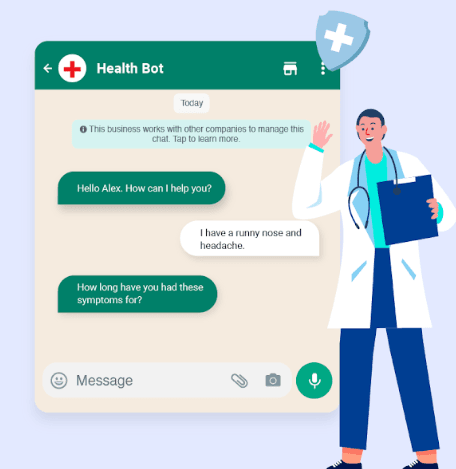
WhatsApp in healthcare isn't limited to just one group of users. Let's explore the different entities that utilize this powerful messaging platform.
Doctors and Physicians
Doctors and physicians are among the primary users of WhatsApp in healthcare. They can use the platform to communicate with colleagues, consult specialists, and collaborate on complex cases.
The ability to quickly exchange information and seek expert opinions enhances the quality of care provided to patients.
Nurses and Other Medical Staff
Nurses and other medical staff play a vital role in patient care. WhatsApp in healthcare enables them to communicate with doctors, report critical updates, and coordinate patient needs efficiently.
Whether it's notifying a physician about a sudden change in a patient's condition or coordinating the scheduling of tests and procedures, WhatsApp for Healthcare streamlines communication and enhances teamwork.
Allied Healthcare Professionals
The benefits of healthcare in WhatsApp are for doctors and nurses, allied healthcare professionals such as pharmacists, physical therapists, etc.
WhatsApp in healthcare allows them to share information, provide guidance, and collaborate with other healthcare team members to ensure comprehensive and coordinated care for patients.
Communication between Patients and Healthcare Providers
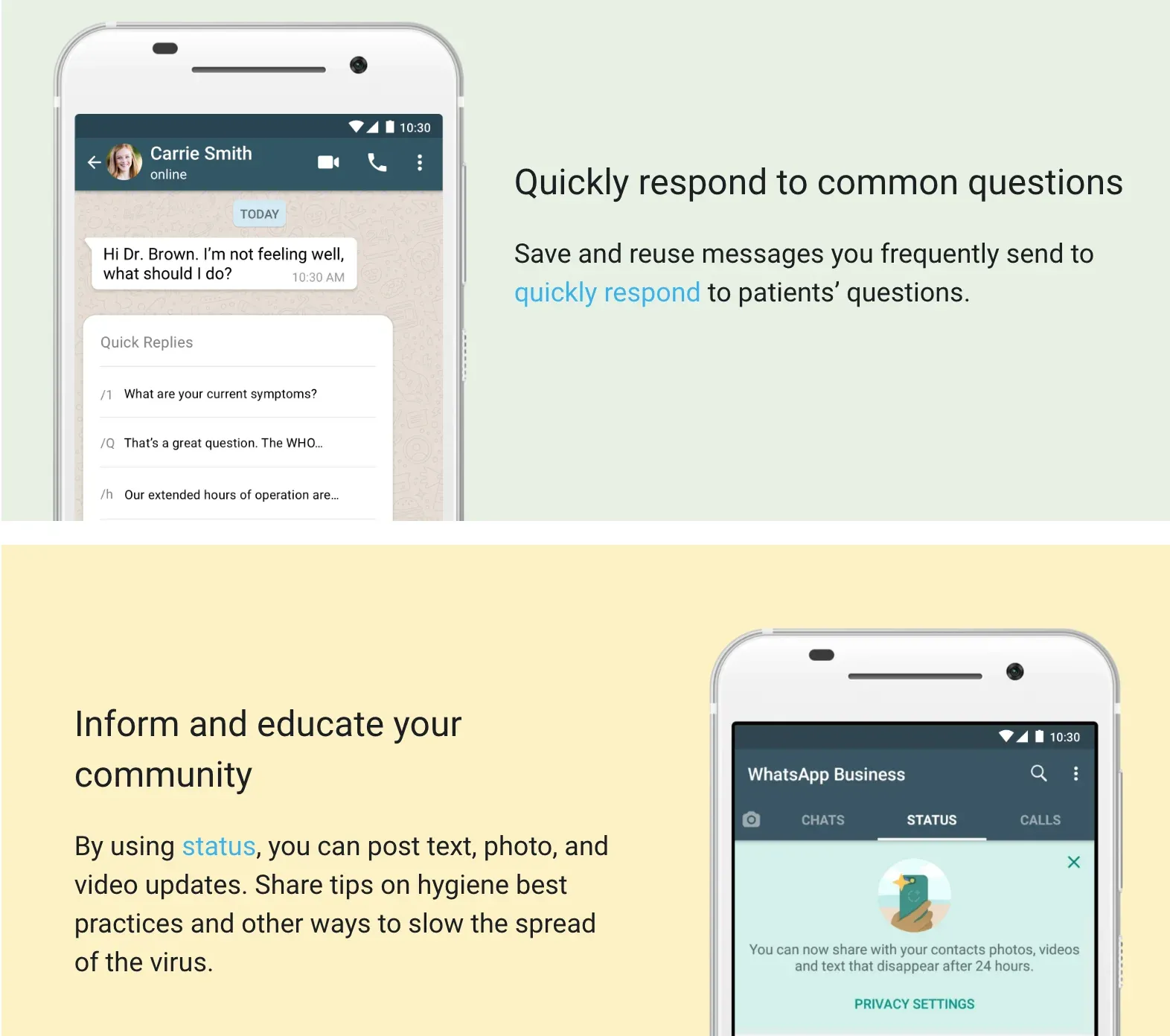
WhatsApp in healthcare bridges the communication gap between patients and healthcare providers.
Patients can use the platform to ask questions, seek clarification about their treatment plans, or report any concerns to their doctors.
Similarly, healthcare providers can use WhatsApp to provide follow-up instructions, answer queries, and offer support remotely.
Support Groups and Patient Communities
WhatsApp also serves as a platform for patients and caregivers to connect with support groups and patient communities.
These groups offer emotional support, share experiences, and provide valuable information to individuals facing similar health challenges.
The sense of belonging and camaraderie fostered in these groups can positively impact the overall well-being of patients and their caregivers.
When is WhatsApp Used in Healthcare?

WhatsApp is used in various scenarios within the healthcare industry. Here are some common use cases:
Hospitals and Clinics
Within hospitals and clinics, WhatsApp is used in various departments, including emergency departments, medical/surgical units, and outpatient clinics.
The benefits of healthcare in WhatsApp comprise communication between healthcare professionals, enabling them to coordinate care, share updates, and discuss treatment plans.
Operating Rooms and Surgical Teams
In operating rooms, WhatsApp in Healthcare plays a crucial role in enhancing communication between surgeons, anesthesiologists, and other members of the surgical team.
It allows for real-time updates during surgeries, quick consultations on complex cases, and seamless coordination of resources.
Telemedicine Consultations
Telemedicine has gained significant popularity, and WhatsApp plays a vital role in enabling virtual consultations between healthcare providers and patients.
Using the platform, doctors can conduct video or audio calls, assess symptoms, and provide remote medical advice, expanding access to care beyond geographical constraints.
Remote Patient Monitoring

WhatsApp's multimedia capabilities make it an excellent tool for remote patient monitoring.
Patients can use the app to share vital signs, report symptoms, or submit photos/videos of wounds or skin conditions.
Healthcare providers can then review the information and offer timely guidance, leading to proactive management of patient's health.
Home Healthcare and Follow-up Care
For patients receiving home healthcare or undergoing post-treatment follow-up, WhatsApp provides a convenient means of communication.
WhatsApp in healthcare allows healthcare professionals to check in with patients, address concerns, provide medication reminders, and monitor progress remotely, reducing the need for frequent in-person visits.
How Does WhatsApp Enhance Healthcare Collaboration and Care?
WhatsApp in healthcare has revolutionized the medical industry by enhancing collaboration and transforming the way care is delivered.
Let's explore how this WhatsApp in healthcare enhances healthcare collaboration and improves patient care.
Real-Time Communication and Decision-Making
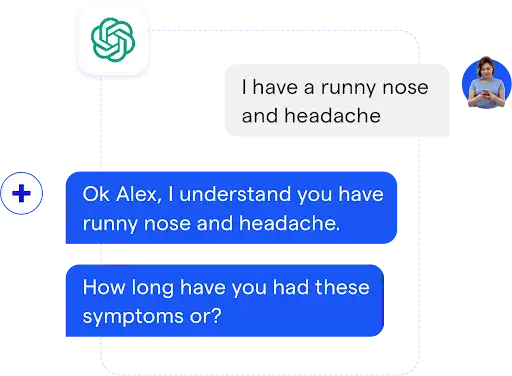
WhatsApp's instant messaging feature enables healthcare professionals to communicate in real time, facilitating quick decision-making and response times.
Doctors can consult specialists, nurses can report critical updates, and healthcare teams can collaborate seamlessly regardless of their physical locations.
Breaking Down Communication Barriers
WhatsApp breaks down communication barriers by providing a platform for multidisciplinary collaboration.
Doctors, nurses, technicians, and administrators can communicate efficiently in group chats, facilitating teamwork and improving care coordination.
Sharing Medical Reports, Images, and Documents
WhatsApp provides a secure platform for sharing sensitive patient information. Healthcare professionals can exchange medical reports, lab results, radiology images, and other essential documents seamlessly.
The benefits of WhatsApp in healthcare enable faster diagnosis, treatment planning, and collaborative decision-making.
Streamlining the Exchange of Patient Information
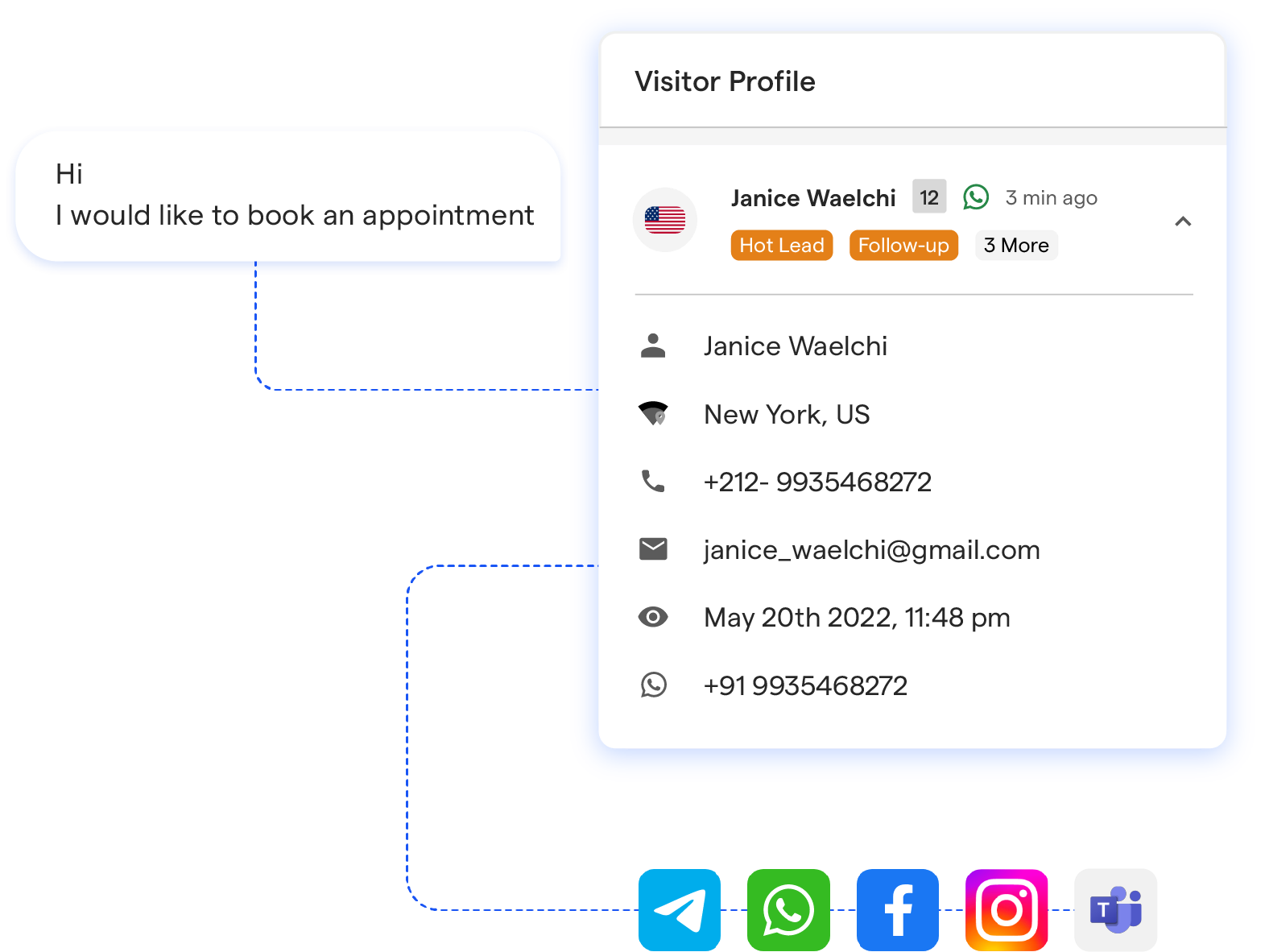
By utilizing WhatsApp, healthcare providers streamline the exchange of patient information.
This eliminates the need for paper-based systems or physically transporting documents, reducing the risk of errors, delays, and miscommunication.
Medical professionals can access necessary patient information promptly, leading to more efficient and well-informed healthcare delivery.
Multimedia Capabilities for Patient Education
WhatsApp's multimedia capabilities, such as photos, videos, and voice messages, play a vital role in patient education.
Healthcare providers can send educational resources, explain treatment plans, and demonstrate self-care techniques using visual aids.
This empowers patients to actively participate in their care and make informed decisions.
Remote Monitoring and Proactive Intervention
Patients can use WhatsApp to share updates on their health status, symptoms, or adherence to medication with healthcare providers.
The benefits of WhatsApp in healthcare include remote monitoring and proactive intervention, ensuring timely adjustments to treatment plans, and minimizing the need for unnecessary hospital visits.
Challenges and Limitations of WhatsApp in Healthcare
While WhatsApp offers numerous benefits, it's essential to acknowledge the challenges and limitations associated with its use in healthcare.
WhatsApp has gained significant traction across healthcare for benefits like enhanced access, care team collaboration and patient engagement.
However, limitations around privacy, security and analytics restrict ubiquitous adoption.
Data Protection Vulnerabilities
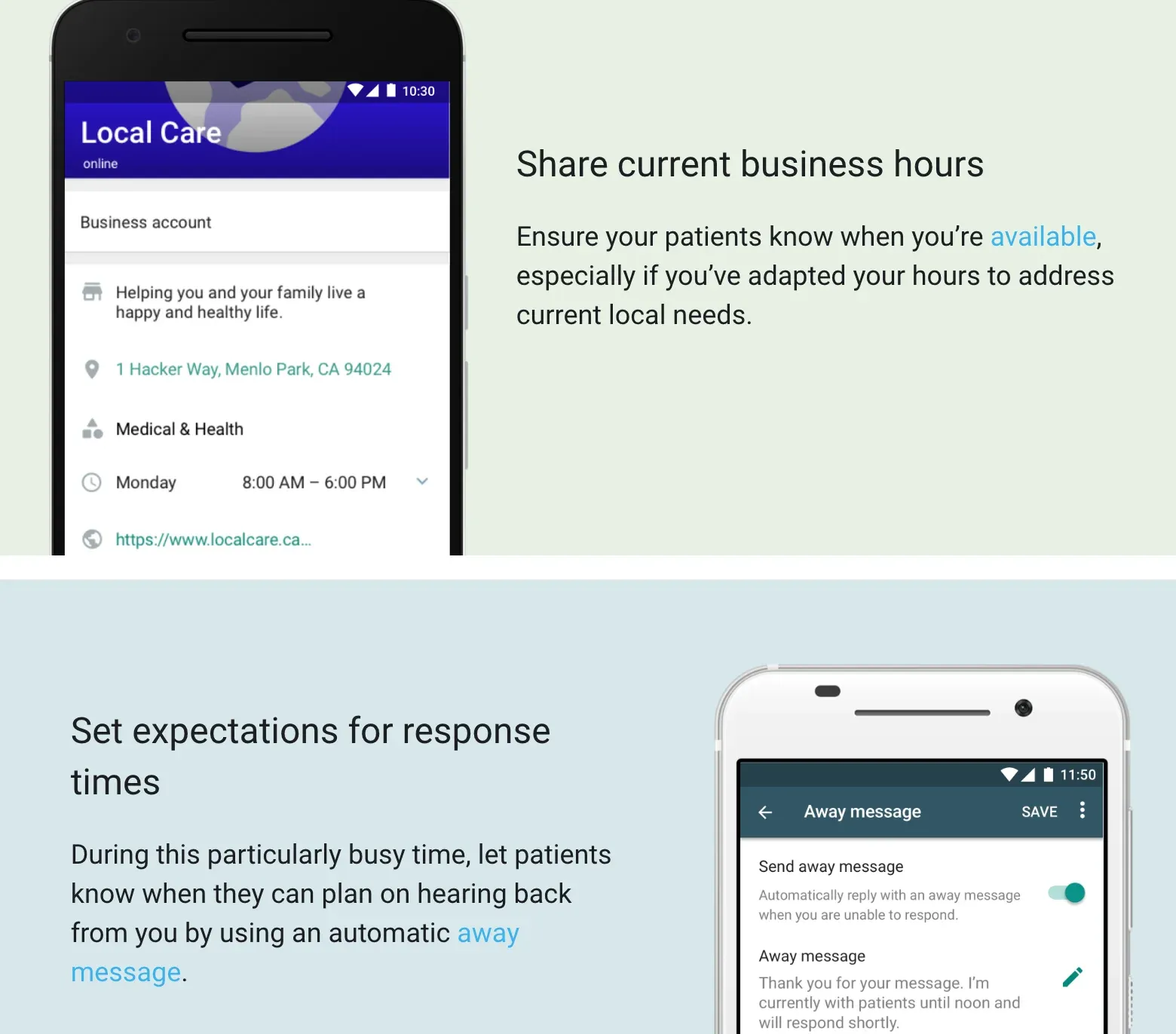
While convenient, relying solely on WhatsApp exposes protected health information (PHI) to risks outside HIPAA bounds given Facebook ownership with unspecified cross-platform data sharing clauses between Whatsapp and its parent entity Facebook as part of joint business interests.
Healthcare organizations must enforce strong access control and audits around WhatsApp communication channels.
Required PHI anonymization before sharing externally remains largely manual. Securing patient chats to prevent unauthorized visibility during workforce changes is also challenging.
Message Traceability Issues
Unlike EHR systems, message traceability for clinical decision accountability within instant messaging remains unreliable.
Referencing previous care advice out of message context is difficult. Critical diagnosis details tend to scatter across disjoint chat threads.
This affects continuity of care and medico-legal auditing. Potential medical errors require extensive, manual log analyzes.
Compliance Limitations
For American hospitals, low compliance confidence restricts extensive PHI sharing via WhatsApp under HIPAA.
Internationally too, evolving country-specific regulations around data localization, cross-border sharing and local server storage requirements are still catching up to guide compliant adoption suited to healthcare.
This will take time to mature uniformly.
Suggested Reading:
Streamline Healthcare Consultancy with WhatsApp Chatbot
Inconsistent Analytics
While business accounts provide some pre-packaged metrics around usage, linkage analysis to correlate messaging initiatives with health outcomes is complex, limiting ROI validation.
There is no native tracking around message open rates, attention time and health behavior changes for targeted patient groups. Hospitals rely on surveys to gauge effectiveness.
In summary, while an efficient medium for patient interactions, shaky foundations around security vulnerabilities, data dispersion issues across fragmented chat trails, partial compliance assurances and analytics limitations currently constrain large-scale organizational adoption of WhatsApp in healthcare.
As solutions emerge targeting these barriers, WhatsApp's central role as part of health IT ecosystems will accelerate.
Best Practices for Using WhatsApp in Healthcare
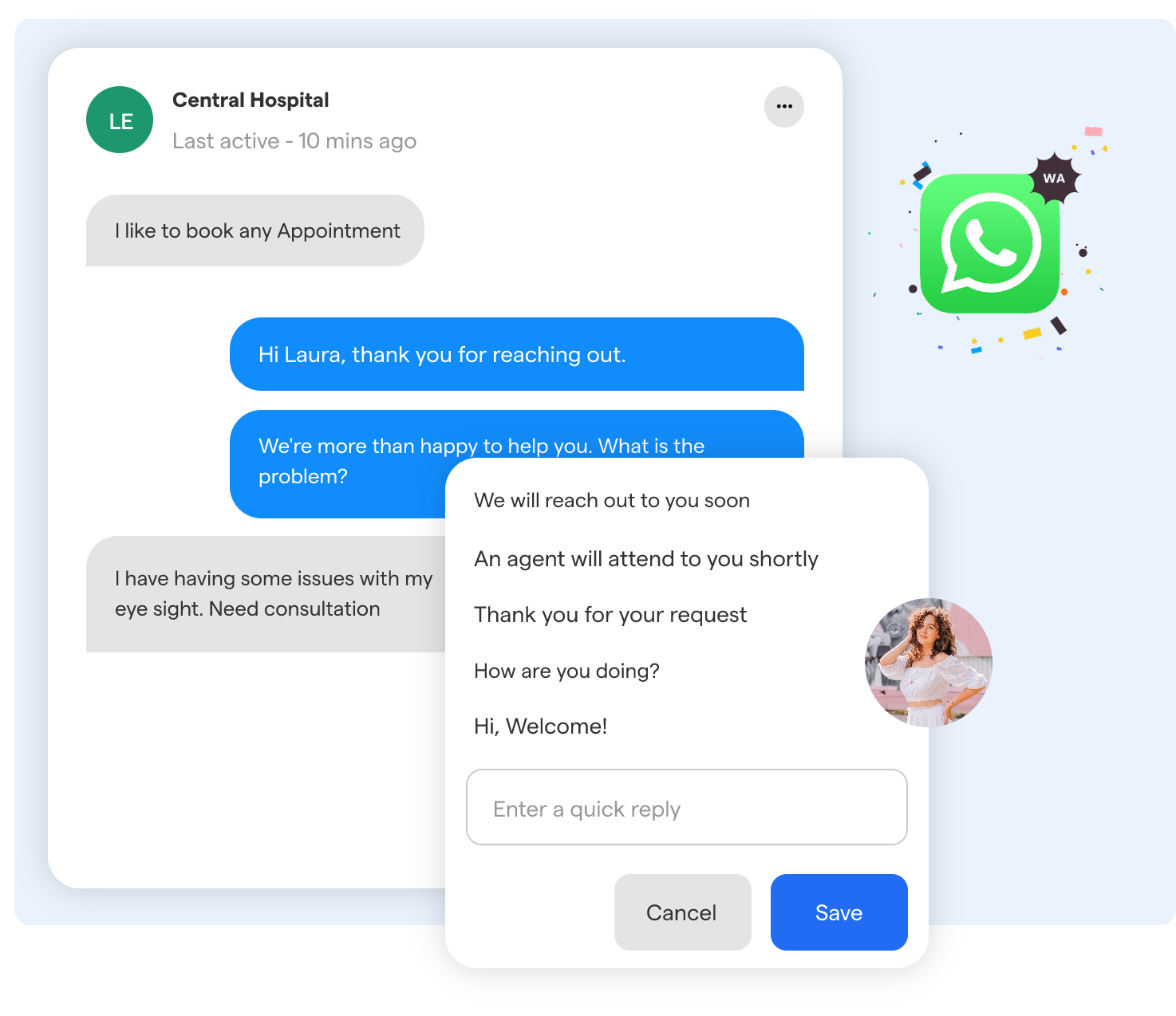
To ensure the effective and secure use of WhatsApp in healthcare, it's essential to follow best practices and guidelines.
Let's explore some key recommendations for using WhatsApp in a healthcare setting.
Develop and Communicate Clear Policies and Guidelines
Establishing clear policies and guidelines is crucial to ensure consistent and responsible use of WhatsApp in healthcare.
These policies should outline acceptable use, privacy and security protocols, and compliance with regulatory requirements.
It's important to communicate these guidelines to all healthcare professionals and provide regular training to ensure their understanding and adherence.
Obtain Informed Consent from Patients
When communicating with patients via WhatsApp, it's essential to obtain informed consent.
Patients should be informed about the purpose of using WhatsApp, its limitations, privacy measures, and their rights regarding the communication platform.
Obtaining consent demonstrates respect for patient autonomy and helps build trust in the healthcare provider-patient relationship.
Suggested Reading:
Integrating Chatbots into Healthcare System: How-To Guide
Protect Patient Privacy and Confidentiality
Patient privacy and confidentiality are paramount in healthcare.
To protect sensitive information, healthcare professionals should avoid sharing personally identifiable information (PII) through WhatsApp. Instead, it's recommended to use patient identifiers that maintain anonymity while ensuring effective communication.
Additionally, healthcare organizations should implement security measures to protect devices used for WhatsApp communication, such as regular device updates and strong passwords.
Establish Protocols for Emergency Situations
In emergencies, clear communication and coordination are crucial.
Healthcare organizations should establish protocols for using WhatsApp during emergencies, ensuring that all relevant healthcare professionals are connected and can quickly communicate critical information.
These protocols should include designated contacts, pre-defined groups, and guidelines for urgent response times.
Future Outlook: WhatsApp and Healthcare Technology
The future holds exciting possibilities for the integration of WhatsApp with other healthcare technologies. Let's explore the potential advancements and benefits that lie ahead.
Integration with Electronic Health Records (EHRs)
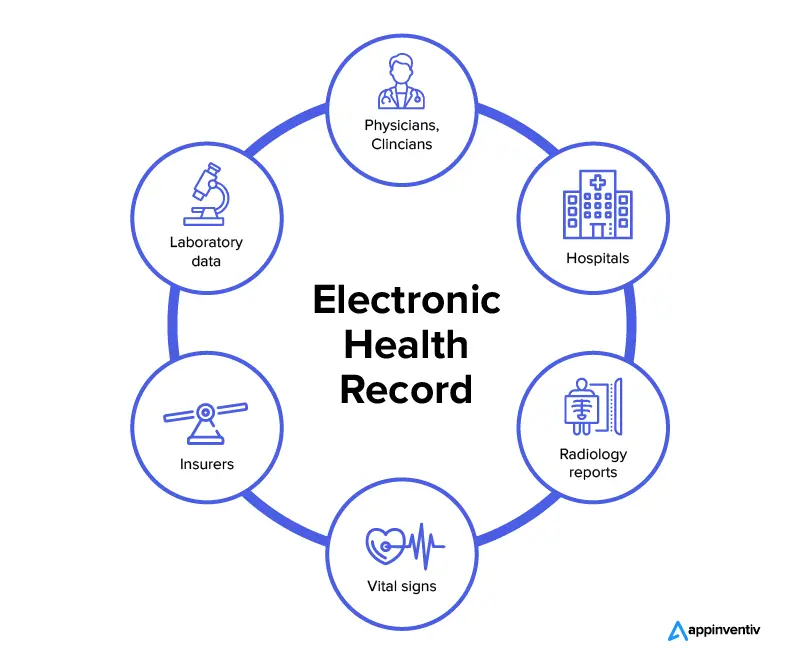
One of the key areas for future development is the integration of WhatsApp with electronic health records (EHRs).
Integrating these platforms would allow a seamless transfer of information between healthcare professionals and the patient's comprehensive medical record.
This integration would streamline communication, improve continuity of care, and enhance patient safety.
Telemedicine Advancements
The use of WhatsApp in telemedicine is expected to advance further.
With the increasing adoption of telehealth services, WhatsApp can play a vital role in facilitating remote consultations, providing secure video conferencing, and enabling virtual monitoring of patients.
This can lead to increased access to care, particularly for individuals in remote areas or with limited mobility.
Artificial Intelligence and Chatbots
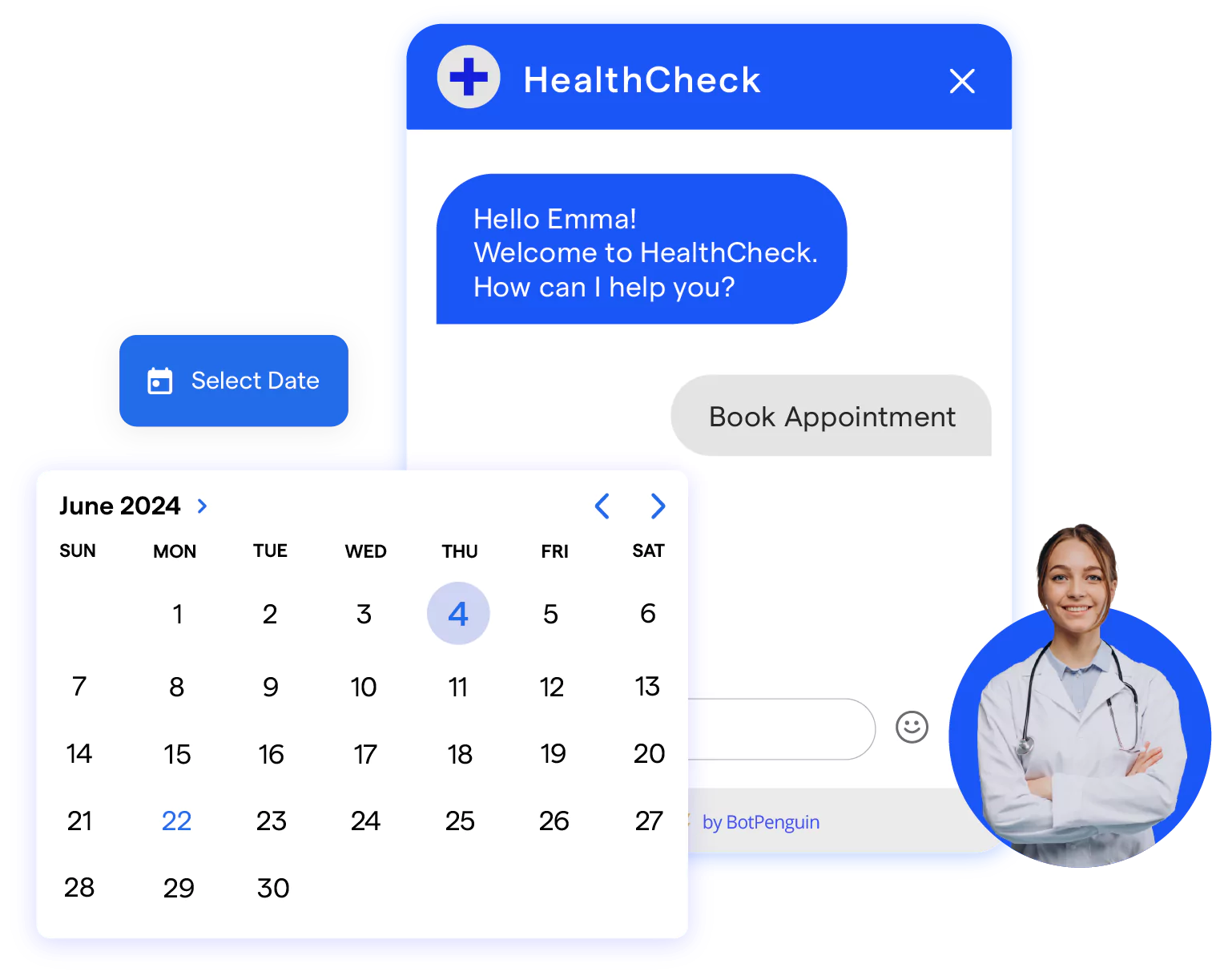
The integration of artificial intelligence (AI) and chatbot technology with WhatsApp holds immense potential.
AI-powered chatbots can provide patients with instant responses to frequently asked questions, offer self-care advice, and guide them to appropriate resources.
This technology can enhance patient education, improve access to information, and relieve the burden on healthcare providers.
Enhanced Data Analytics and Insights
As healthcare organizations collect and analyze data from WhatsApp communication, valuable insights can be gained.
Data analytics can help identify trends, improve care coordination, and enhance patient outcomes.
By leveraging WhatsApp data, healthcare professionals can make informed decisions, identify areas for improvement, and tailor healthcare delivery to meet the needs of patients more effectively.
Conclusion
WhatsApp has emerged as a powerful tool for enhancing collaboration and care in the healthcare industry.
Research shows that 93% of providers believe faster, more efficient communication will lead to better patient outcomes (Source: MobileSmith Health 2019 Report).
To maximize the benefits of WhatsApp in healthcare, healthcare organizations should establish clear policies and guidelines, obtain informed consent from patients, protect patient privacy and confidentiality, and establish protocols for emergencies.
WhatsApp chatbots, such as those created using BotPenguin, have proven to be valuable tools in the healthcare industry. They offer numerous benefits, including streamlined appointment scheduling, efficient symptom assessment, medication reminders, and easy access to health information.
By leveraging the power of WhatsApp and chatbot technology, healthcare providers can enhance patient experience and improve efficiency. It can provide timely and convenient healthcare services.
WhatsApp chatbots have the potential to revolutionize the way healthcare is delivered, making it more accessible and personalized for patients worldwide.
Frequently Asked Questions (FAQs)
How does WhatsApp enhance collaboration among healthcare professionals?
WhatsApp facilitates instant and efficient communication, allowing healthcare professionals to connect in real time and make quick decisions.
It breaks down communication barriers, enabling multidisciplinary collaboration and improving care coordination.
Is WhatsApp secure for exchanging patient information?
WhatsApp offers end-to-end encryption, ensuring the security of messages and files shared between healthcare professionals.
However, healthcare organizations should establish policies to protect patient privacy and comply with relevant regulations.
Can WhatsApp be used for remote patient monitoring?
Yes, WhatsApp can be used for remote patient monitoring. Patients can share health updates, symptoms, or medication adherence through the app, enabling healthcare providers to monitor their progress and intervene when necessary.
How does WhatsApp improve patient education?
WhatsApp's multimedia capabilities, such as photos and videos, enable healthcare professionals to share educational resources, treatment plans, and self-care techniques with patients.
This empowers patients to actively participate in their care and make informed decisions.
What are the limitations of using WhatsApp in healthcare?
WhatsApp is not specifically designed for healthcare purposes and lacks direct integration with electronic health records (EHRs).
This may result in fragmented communication and the need for manual data entry, affecting workflow efficiency.


